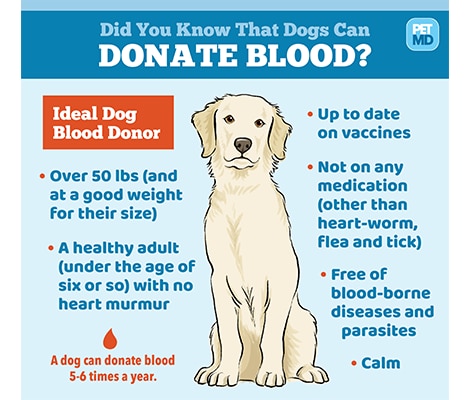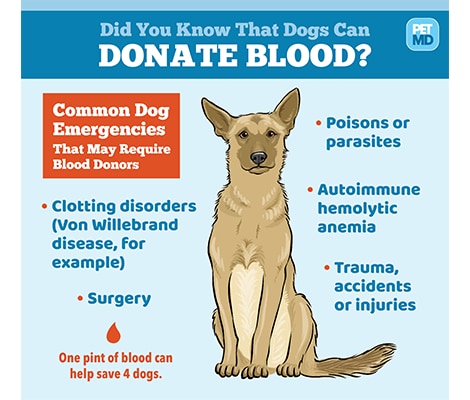How Do You Know if You Need Blood Transfusion
Is there really such thing equally a blood transfusion for dogs? Yes, dogs suffering from severe blood loss or blood diseases tin receive blood transfusions from some other healthy dog to help them recover.
Just matching them upward is a fiddling more than involved since in that location are canis familiaris blood types than in people, and the types are more complex.
Here's everything you lot need to know most canis familiaris claret types and how canis familiaris blood transfusions and donations work.
Do Dogs Have Different Blood Types?
Yes, they do. In fact, over a dozen different dog blood types have been found and so far, and nosotros'll probably continue to discover more than types with more research.
Blood types in dogs are genetic with complex inheritance patterns. Each blood group is inherited independently, which means that a domestic dog could accept any combination of the 12+ blood groups.
This creates variability in which blood types are about common depending on geographic area and breed.
Even though there are many dog claret types and possible combinations, the one called "domestic dog erythrocyte antigen 1" (DEA 1) is the most medically of import.
Some dogs are negative for DEA 1, but if they're positive, they can accept ane of 2 forms—DEA 1.one or DEA i.two.
What'south the Best Claret Blazon for Dog Blood Donations?
Dogs that are negative for DEA 1 are preferred for donating blood considering their blood can be safely transferred to dogs that are negative or positive for DEA 1.1 or DEA one.2.
However, DEA 1 negative dogs aren't truly "universal donors" because a dog may be positive for another blood type that might cause an event.
To make sure in that location won't be a serious immune reaction to any of a donor domestic dog'due south blood types, the veterinary will do some other test called "crossmatching." This test checks the overall compatibility of donor and recipient claret.
After confirming DEA 1 blood type and running a crossmatching exam, a veterinarian can typically decide which type of blood volition be the almost successful for the dog receiving the transfusion.
What Are the Other Qualifications for Dogs Donating Blood?
While in a true emergency, theoretically, any domestic dog could donate blood, some dogs are better blood donors. We already know that vets prefer a DEA i Negative blood type, but here are a few more than qualifications that they look for.
The platonic dog for donating blood is:
-
Over 50 pounds (and at a healthy weight for their size; larger dogs can donate a larger volume of blood more hands and oftentimes than smaller dogs)
-
Upward to date on their vaccines
-
Healthy (with no center murmur)
-
Not on any medication
-
Costless of infectious affliction, parasites and claret-borne diseases
-
At-home (able to sit quietly for ten-15 minutes while claret is being collected)
-
DEA 1 Negative
If the DEA 1 claret type is compatible and there'due south no immune response seen with the crossmatching tests, then it'southward safe to go ahead with the canis familiaris blood transfusion.

What Domestic dog Health Issues Require a Claret Transfusion?
A dog might need a blood transfusion to supplant blood afterwards severe blood loss from either surgery or trauma.
At that place are also some diseases (e.chiliad., Von Willebrand disease) that can cause bleeding and serious blood loss, which can be treated with a blood transfusion.
Other diseases damage and destroy blood cells, so a blood transfusion can aid supervene upon these and allow the dog to feel better.
For dogs with any of these atmospheric condition, getting a claret transfusion from some other dog can be life-saving.

What's the Process for Dog Blood Transfusions?
Here are the steps for finding a match and what will happen during the actual blood transfusion.
Finding a Dog Blood Donor
There are ii ways that veterinarians can source blood for a transfusion.
They can pull blood from a willing canine donor or contact a pet blood bank and request blood.
Vets tin order from national pet claret banks, and many local emergency and specialty hospitals have their ain pet blood banks, too.
Dog Blood Type Testing
The claret types of both dogs must be matched before the transfusion.
The vet will take a sample of blood from the dog getting the transfusion to cheque for an immune response to a sample of blood taken from the donor domestic dog, and then this process is reversed.
This is an of import footstep considering giving DEA ane Positive blood to a canis familiaris that's DEA ane Negative tin cause the allowed system to attack the newly transfused blood cells—reducing their effectiveness and potentially causing serious allergic reactions.
After both dogs are claret typed for DEA i, then crossmatching tests are run as well.
The Dog Blood Transfusion Procedure
Whether it's going to a blood bank or direct to a waiting dog, the blood is collected and kept in special bags that keep the blood from clotting.
When it'due south time to give a dog a blood transfusion, these numberless are hooked upwards to an IV (intravenous) fluid line with a special filter congenital in. The blood transfusion is given direct into the vein through the Iv catheter.
The total dose of blood to be transfused is based on the dog's size and how much claret they have lost. This is given over a specific fourth dimension period, and the dog is monitored very closely to be sure they aren't developing an allergic reaction.
For many wellness bug, a unmarried blood transfusion is all that's needed to help the domestic dog recover. For some diseases where there is ongoing claret loss or destruction of blood cells, the dog may demand repeated blood transfusions.
Fortunately, most dogs never need a blood transfusion, merely for those that do, it tin can be lifesaving.
By: Dr. Aja Senestraro, DVM
Featured Image: iStock.com/andresr
Source: https://www.petmd.com/dog/general-health/dog-blood-types-and-dog-blood-donation-0
0 Response to "How Do You Know if You Need Blood Transfusion"
ارسال یک نظر